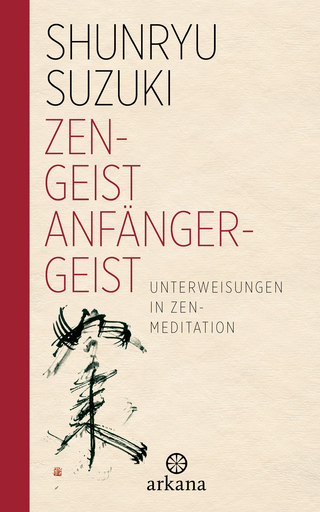
The Vimalakirti Sutra
Seiten
1996
Columbia University Press (Verlag)
978-0-231-10656-6 (ISBN)
Columbia University Press (Verlag)
978-0-231-10656-6 (ISBN)
- Lieferbar (Termin unbekannt)
- Versandkostenfrei innerhalb Deutschlands
- Auch auf Rechnung
- Verfügbarkeit in der Filiale vor Ort prüfen
- Artikel merken
This text is a translation of one of the most influential works of the Mahayana Buddhist canon, and is of particular importance to the Ch'an or Zen sect. Written in the first century BC, it claims to record events from the time of Sakyamuni Buddha, over 400 years earlier.
One of the most popular Asian classics for roughly two thousand years, the Vimalakirti Sutra stands out among the sacred texts of Mahayana Buddhism for its conciseness, its vivid and humorous episodes, its dramatic narratives, and its eloquent exposition of the key doctrine of emptiness or nondualism. Unlike most sutras, its central figure is not a Buddha but a wealthy townsman, who, in his mastery of doctrine and religious practice, epitomizes the ideal lay believer. For this reason, the sutra has held particular significance for men and women of the laity in Buddhist countries of Asia, assuring them that they can reach levels of spiritual attainment fully comparable to those accessible to monks and nuns of the monastic order. Esteemed translator Burton Watson has rendered a beautiful English translation from the popular Chinese version produced in 406 C.E. by the Central Asian scholar-monk Kumarajiva, which is widely acknowledged to be the most felicitous of the various Chinese translations of the sutra (the Sanskrit original of which was lost long ago) and is the form in which it has had the greatest influence in China, Japan, and other countries of East Asia.
Watson's illuminating introduction discusses the background of the sutra, its place in the development of Buddhist thought, and the profundities of its principal doctrine: emptiness.
One of the most popular Asian classics for roughly two thousand years, the Vimalakirti Sutra stands out among the sacred texts of Mahayana Buddhism for its conciseness, its vivid and humorous episodes, its dramatic narratives, and its eloquent exposition of the key doctrine of emptiness or nondualism. Unlike most sutras, its central figure is not a Buddha but a wealthy townsman, who, in his mastery of doctrine and religious practice, epitomizes the ideal lay believer. For this reason, the sutra has held particular significance for men and women of the laity in Buddhist countries of Asia, assuring them that they can reach levels of spiritual attainment fully comparable to those accessible to monks and nuns of the monastic order. Esteemed translator Burton Watson has rendered a beautiful English translation from the popular Chinese version produced in 406 C.E. by the Central Asian scholar-monk Kumarajiva, which is widely acknowledged to be the most felicitous of the various Chinese translations of the sutra (the Sanskrit original of which was lost long ago) and is the form in which it has had the greatest influence in China, Japan, and other countries of East Asia.
Watson's illuminating introduction discusses the background of the sutra, its place in the development of Buddhist thought, and the profundities of its principal doctrine: emptiness.
Burton Watson is one of the world's best-known translators from the Chinese and Japanese. His translations include The Lotus Sutra, Chuang Tzu: Basic Writings, Ryokan: Zen Monk-Poet of Japan, Saigyo: Poems of a Mountain Home, and The Columbia Book of Chinese Poetry: From Early Times to the Thirteenth Century, all published by Columbia.
Translator's Note Introduction The Vimalakirti Sutra 1. Buddha Lands 2. Expedient Means 3. The Disciples 4. The Bodhisattvas 5. Inquiring About the Illness 6. Beyond Comprehension 7. Regarding Living Beings 8. The Buddha Way 9. Entering the Gate of Nondualism 10. Fragrance Accumulated 11. Actions of the Bodhisattvas 12. Seeing Akshobhya Buddha 13. The Offering of the Law 14. Entrustment Glossary
| Erscheint lt. Verlag | 21.11.1996 |
|---|---|
| Reihe/Serie | Translations from the Asian Classics |
| Übersetzer | Burton Watson |
| Verlagsort | New York |
| Sprache | englisch |
| Maße | 140 x 216 mm |
| Themenwelt | Geisteswissenschaften ► Religion / Theologie ► Buddhismus |
| ISBN-10 | 0-231-10656-4 / 0231106564 |
| ISBN-13 | 978-0-231-10656-6 / 9780231106566 |
| Zustand | Neuware |
| Haben Sie eine Frage zum Produkt? |
Mehr entdecken
aus dem Bereich
aus dem Bereich
Philosophische Betrachtungen
Buch | Softcover (2024)
Aufbau TB (Verlag)
12,00 €
Unterweisungen in Zen-Meditation
Buch | Hardcover (2024)
Arkana (Verlag)
20,00 €


